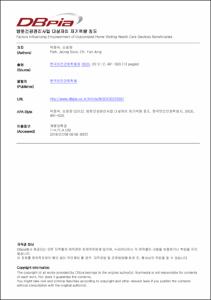방문건강관리사업 대상자의 자기역량 정도
- Affiliated Author(s)
- 박정숙
- Alternative Author(s)
- Park, Jeong Sook
- Journal Title
- 한국보건간호학회지
- ISSN
- 1226-0290
- Issued Date
- 2012
- Keyword
- Empowerment; Home visiting health service
- Abstract
- Purpose: The purpose of this study was to measure empowerment and to identify factors influencing empowerment. Method: Subjects included 767 clients registered with the customized home visiting health services in Daegu. Data collection was performed from June 3 to July 30, 2011. Descriptive statistics, χ2 test, ANOVA, and stepwise multiple regression were used in this study. Results: The mean score for total empowerment was 3.01(±0.28). In subscales of total empowerment, the score for individual empowerment was 2.97(±0.36), the score for interpersonal relationship empowerment was 3.09(±0.34), and the score for political-social empowerment was 2.96(±0.48). Job, education, economic status, living arrangement, and client classification were significant factors related to total empowerment in these clients. Job, education, economic status, types of health insurance, living arrangement, age, and client classification were significant factors related to individual empowerment, interpersonal relationship empowerment and political-social empowerment. 4.4 percent of the variance in total empowerment can be explained by education and living arrangement (Cum R2=0.044, F=13.207, p<.001). Individual empowerment, interpersonal
relationship empowerment, and political-social empowerment can be explained by education,
job, economic status, and living arrangement. Conclusion: An empowerment intervention
that includes general characteristics of clients is essential to improving empowerment of
customized home visiting health care services beneficiaries.
본 연구의 목적은 맞춤형 방문건강관리사업 대상자의 자기역량 정도와 자기역량에 영향을 미치는 요인을 규명하여 대상자의 자기역량을 향상시킬 수 있는 간호중재를 개발하는데 기초자료를 제공하고자 하는 것이다. 연구결과 맞춤형 방문건강관리사업 대상자의 자기역량 점수는 3.01점으로 나타났고, 하위영역인 개인내적 역량은 2.97점, 대인관계적 역량은 3.09점, 정치사회적 역량은 2.96점으로 나타났다. 일반적인 특성에 따른 자기역량 정도는 직업, 교육정도, 경제적 수준, 독거유무, 대상자 군분류에 따라 유의한 차이가 있었다. 자기역량의 하위영역인 개인내적 역량, 대인관계적 역량, 정치사회적 역량에서도 직업, 교육정도, 경제적 수준, 건강보험, 대상자 군분류, 독거유무, 연령에 따라 유의한 차이가 있었다. 자기역량을 설명하는 주요 변수로는 교육정도와 독거유무로 나타났고, 맞춤형 방문건강관리 사업 대상자의 자기역량을 4.4% 설명하였다(F=13.207, p<.001). 자기역량의 하위영역인 개인내적 역량, 대인관계적 역량, 정치사회적 역량을 설명하는 주요변수로는 경제적인 수준, 직업, 교육정도와 독거유무인 것으로 나타났다. 따라서 맞춤형 방문건강관리사업 대상자의 자기역량 강화정도를 향상시키기 위해서는 대상자의 경제적인 특성을 고려하고, 가족, 친구, 사회 구성원들과의 상호작용을 촉진할 수 있는 중재 전략을 개발, 적용해야 할 것으로 사료된다. 본 연구는 대상자가 일 지역에 국한되어 있어서 연구결과를 전체 맞춤형 방문건강관리 대상자에게 일반화시키기에는 제한점이 있으므로 연구결과를 확대해석할 때 신중을 기해야 할 것이며, 방문전담인력이 대상자 진단에서부터 자기역량 강화 중재 전략이 적용될 수 있도록 표준화된 프로토콜을 마련할 필요가 있다.
- Alternative Title
- Factors Influencing Empowerment of Customized Home Visiting Health Care Services Beneficiaries
- Department
- Dept. of Nursing (간호학)
- Publisher
- College of Nursing
- Citation
- 박정숙 and 오윤정. (2012). 방문건강관리사업 대상자의 자기역량 정도. 한국보건간호학회지, 26(3), 491–503.
- Type
- Article
- ISSN
- 1226-0290
- Appears in Collections:
- 2. College of Nursing (간호대학) > Dept. of Nursing (간호학)
- 파일 목록
-
-
Download
 oak-bbb-05155.pdf
기타 데이터 / 811.82 kB / Adobe PDF
oak-bbb-05155.pdf
기타 데이터 / 811.82 kB / Adobe PDF
-
Items in Repository are protected by copyright, with all rights reserved, unless otherwise indicated.